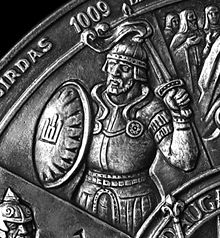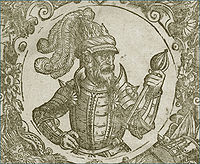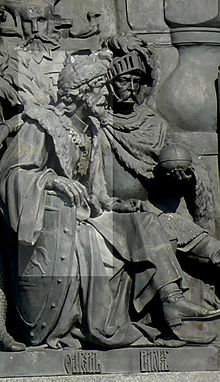- Algirdas
-
Algirdas Grand Duke of Lithuania 
Fragment from a medal by Juozas KalinauskasReign 14th century
1316–1377
1345–1377 (as Grand Duke of Lithuania)Born ca 1296 Died end of May 1377 Place of death Maišiagala (?) Predecessor Jaunutis Successor Jogaila Consort Maria of Vitebsk
UlianaOffspring Sons:
Daughters:
Demetrius I Starszy
Andrei
Konstantin
Vladimir
Fiodor
Jogaila
Skirgaila
Dymitr Korybut
Lengvenis
Karigaila
Vygantas
Švitrigaila
Fiedora
Nowosielska
Agrypina
Kenna
Helena of Moscow
Maria
Wilheida
Alexandra
Jadwiga OświęcimskaRoyal House Gediminids Father Gediminas Mother Jewna Algirdas (Belarusian: Альгерд, Polish: Olgierd) (c. 1296 – May 1377) was a monarch of medieval Lithuania. Algirdas ruled the Grand Duchy of Lithuania from 1345 to 1377, which chiefly meant monarch of Lithuanians and Ruthenians. With the help of his brother Kęstutis, who defended the western border of the Duchy, he created a vast empire stretching from the Baltics to the Black Sea and reaching within fifty miles of Moscow.
Contents
Background
Algirdas was one of the seven sons of the Grand Duke Gediminas. Before his death in 1341 Gediminas divided his domains, leaving the youngest son Jaunutis in possession of the capital Vilnius, with a nominal priority. With the aid of his brother Kęstutis, Algirdas drove out the incapable Jaunutis and declared himself a Grand Prince in 1345. Thirty two years of his reign (1345–1377) were devoted to the development and expansion of the Grand Duchy of Lithuania. Algirdas has managed to make it one of the greatest states in Europe and the largest in the continent.
Two factors are supposed to have contributed to achieve this result; the extraordinary political sagacity of Algirdas and the life-long devotion of his brother Kęstutis. A neat division of their dominions is illustrated by the fact, that Algirdas appears almost only in East Slavic sources, whereas the Western chronicles are aware of mostly Kęstutis. The Teutonic knights in the north and the Tatar hordes in the south were equally bent on the subjection of Lithuania, while Algirdas' eastern and western neighbors Muscovy and Poland generally were hostile competitors.
Expansion of Lithuania
Algirdas not only succeeded in holding his own, but acquired influence and territory at the expense of Muscovy and the Golden Horde, and extended the borders of the Grand Duchy of Lithuania to the northern shore of the Black Sea. Principal efforts of Algirdas were directed to securing the Slavonic lands which had been a part of the former Kievan Rus. He procured the election of his son Andrew as the Prince of Pskov, and a powerful minority of the citizens of the Republic of Novgorod held the balance in his favor against the Muscovite influence, however his ascendancy in both these commercial centres was at the best precarious.
Algirdas occupied the important principalities of Smolensk and Bryansk in the western Russia. Although his relations with the grand dukes of Muscovy were friendly on the whole, as he has married two Orthodox Russian princesses, this did not prevent him from besieging Moscow in 1368 and again in 1372, both times unsuccessfully.
An important feat of Algirdas was his victory over the Tatars in the Battle of Blue Waters at the Southern Bug in 1362. It resulted in breaking up of the powerful Kipchak horde and compelled the khan to migrate still farther south and establish his headquarters for the future in the Crimea.
Religion and death
Modern historians argue, that "For Gediminas and Algirdas, retention of paganism provided a useful diplomatic tool and weapon... that allowed them to use promises of conversion as a means of preserving their power and independence".[1] According to Hermann von Wartberge and Jan Długosz, Algirdas remained a pagan until his death in summer 1377. Contemporary Byzantine accounts also support the Western sources: Patriarch Neilos described Algirdas as fire-worshipping prince;[2] another Patriarch Philotheos excommunicated all Ruthenian noblemen, who helped impious Algirdas.[3] Algirdas' pagan faith also went into the 14th Byzantine historian's Nicephorus Gregoras' accounts.[4]
Algirdas was burned on a ceremonial pyre together with 18 horses and many of his possessions in a wood near Maišiagala[5] most probably in Kukaveitis forest shrine located at 54°55′42″N 25°01′04″E / 54.92833°N 25.01778°E.[6] His proposed burial site is undergoing archaeological research since 2009.[7] His descendants include the noble families of Troubetzkoys, Czartoryskis, and Sanguszkos.
In retrospect Algirdas appeared to the Orthodox faithful of Ukraine and Belarus as a champion of Orthodoxy. The 16th-century Bychowiec Chronicle and 17th-century Hustynska Chronicle maintain that he converted to Orthodox Christianity at some point prior to his marriage to Maria of Vitebsk in 1318. Although several Orthodox churches were indeed built in Vilnius during his reign, later assertions about his baptism find no corroboration in sources dating from Algirdas' life, leading most scholars to reject them as spurious. Despite the contemporary accounts, as well as modern studies,[8][9] some Russian historians, such as Batiushikov, claim that Algirdas had been an Orthodox ruler.
Nevertheless, the dubious tradition about Algirdas' Orthodox conversion lived on. The commemoration book of the Kiev Monastery of the Caves, underwritten by Algirdas' descendants, recorded his baptismal name as "Demetrius" as early as 1460s. Following Wojciech Wijuk Kojałowicz and Macarius I, Volodymyr Antonovych writes that Algirdas took monastic vows several days before his death and was interred at the Cathedral of the Theotokos, Vilnius under the monastic name Alexius.
Algirdas is said to have ordered the death of Anthony, John, and Eustathius of Vilnius, who were later glorified as martyrs of the Russian Orthodox Church.
Assessment
 Litas commemorative coin with an image of Algirdas
Litas commemorative coin with an image of Algirdas
Algirdas wisely vacillated between Muscovy and Poland, spoke Lithuanian and amongst others the Ruthenian language, and was more inclined to follow the majority of his pagan and Orthodox subjects rather than to alienate them by promoting Roman Catholicism. His son Jogaila, however, ascended the Polish throne, converted to Roman Catholicism and founded the dynasty which ruled Lithuania and Poland for nearly 200 years.
See also
- Gediminids
- House of Algirdas – family tree of Algirdas
References
- General
 This article incorporates text from a publication now in the public domain: Chisholm, Hugh, ed (1911). Encyclopædia Britannica (11th ed.). Cambridge University Press.
This article incorporates text from a publication now in the public domain: Chisholm, Hugh, ed (1911). Encyclopædia Britannica (11th ed.). Cambridge University Press.
- Inline
- ^ Muldoon, James. Varieties of Religious Conversion in the Middle Ages. University Press of Florida, 1997. Page 140.
- ^ F. Miklosich, J. Mūller. Acta Patriarchatus Constantinopolitan. Vienna, 1862, Vol. 2, p.12
- ^ F. Miklosich, J. Mūller. Acta Patriarchatus Constantinopolitan. Vienna, 1862, Vol. 1, pp. 523-524
- ^ I. Bekker. Nicephori Gregorae Historiae Byzantinae. Bonn, 1829, Vol. 3 pp. 517-520
- ^ "He was cremated with the best horses, clothes, resplendent in gold and girdled with a gilted silver belt and was covered with a gown woven of beads and gems", Marija Gimbutas has observed.
- ^ (Lithuanian)Vykintas Vaitkevičius, Kukaveičio šventvietės mįslės in Šiaurės Atėnai 2008-05-02
- ^ Lokalizavo kunigaikščio Algirdo palaikų kremavimo vietą. retrieved on 2009-05-22
- ^ Contributed by Antoni Prochaska, Jan Ochmanski, Gotthold Rhode, Marija Gimbutas, Edvardas Gudavičius etc.
- ^ Mažeika, Rasa (1987). "Was Grand Prince Algirdas a Greek Orthodox Christian?". Lituanus 33 (4). http://www.lituanus.org/1987/87_4_05.htm. Retrieved 2007-09-06.
Preceded by
JaunutisGrand Prince of Lithuania
1345–1377Succeeded by
JogailaMonarchs of Lithuania Early Grand Dukes Gediminids Butigeidis · Butvydas · Vytenis · Gediminas (family) · Jaunutis · Algirdas (family) · Jogaila (family) · Kęstutis (family) · Skirgaila · Vytautas · Švitrigaila · Sygismund Kestutian · Casimir Jagellon · Alexander · Sigismund I the Old · Sigismund II AugustusElected Henry III of Valois · Anna the Jagiellonian · Stephen Báthory · Sigismund III Vasa · Ladislaus IV Vasa · John II Casimir Vasa · Michael Korybut Wiśniowiecki · John III Sobieski · Augustus II the Strong · Stanisław Leszczyński · August III the Saxon · Stanisław August PoniatowskiCategories:- 1296 births
- 1377 deaths
- Belarusian nobility
- Gediminids
- Grand Dukes of Lithuania
- Ruthenian nobility
- Converts to Eastern Orthodoxy
- Orthodox monarchs
Wikimedia Foundation. 2010.


